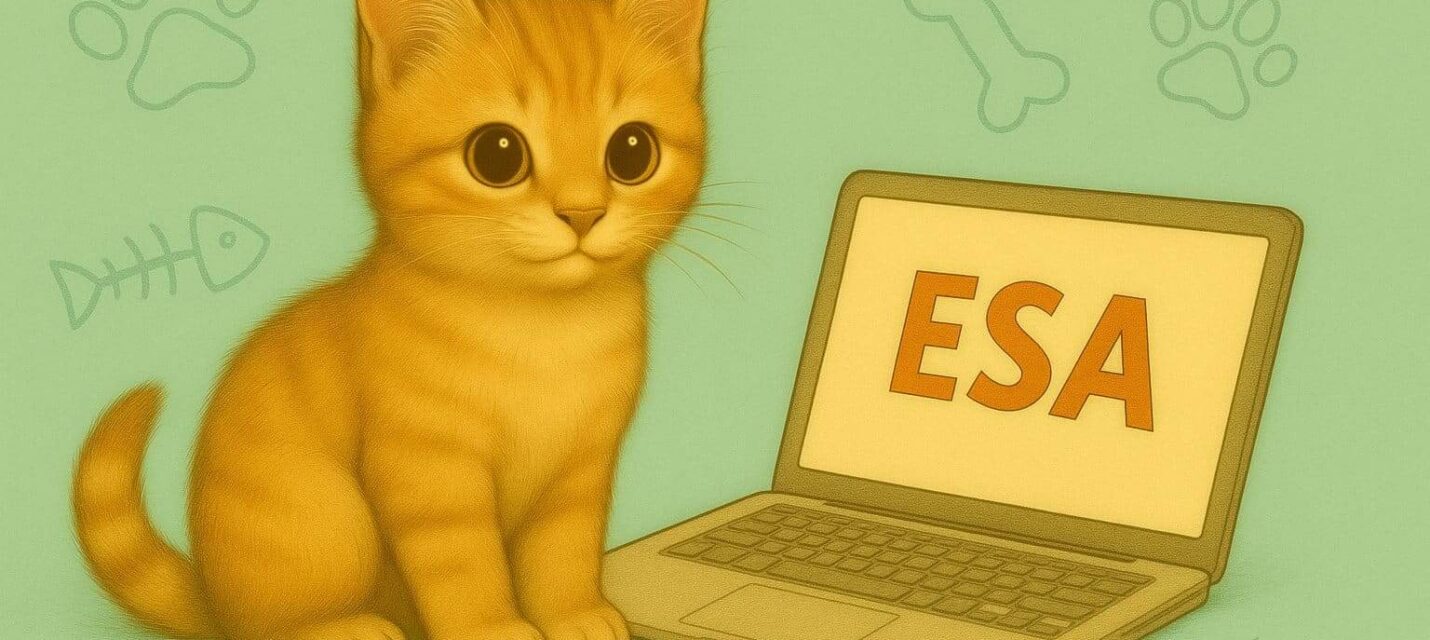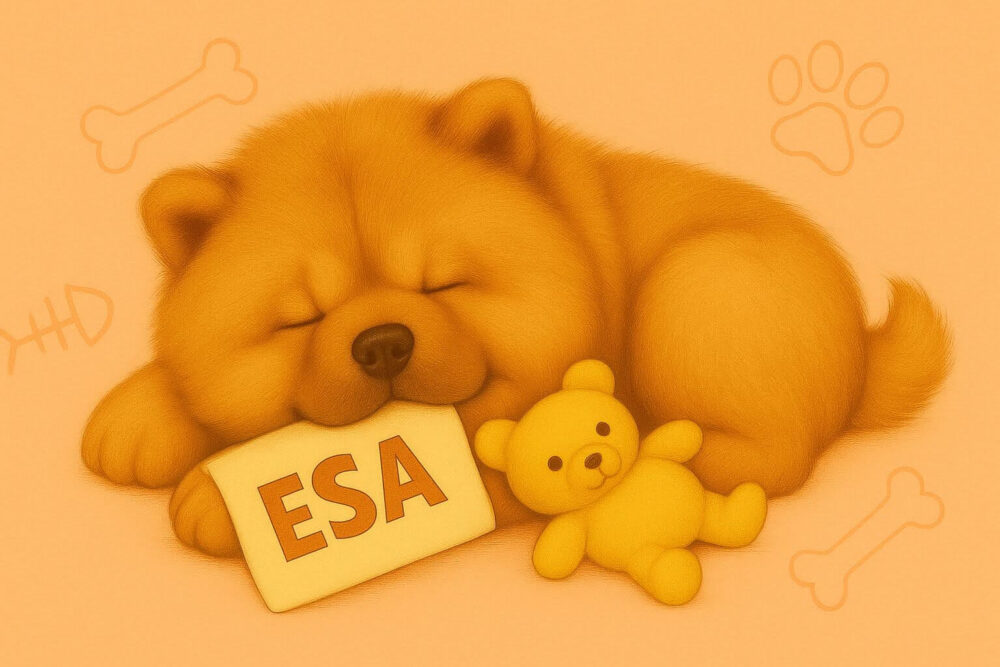
Table of Contents
Reptiles can make for wonderful pets. They’re odorless, hypoallergenic, and low-maintenance. Plus, with so many species to choose from, everyone can find a scaly buddy that matches their vibe and lifestyle.
But for people living with a mental health condition, these little beasties can also be therapeutic. Watching them chill is calming, handling them feels reassuring, and having them around eases anxiety, depression, and loneliness. If that sounds familiar, you might be wondering: Can reptiles be emotional support animals?
In this guide, we’ll discuss the possibility of ESA reptiles, explore the best species for emotional support, and break down the process of acquiring one for your mental health needs.

Can a Reptile Be an Emotional Support Animal?
Yes, your cold-blooded companion can serve as an emotional support animal (ESA) if you have the right paperwork. The Fair Housing Act (FHA), the federal law protecting ESAs, doesn’t discriminate based on species or breed. This means any animal can be an ESA as long as:
- It benefits your emotional or mental well-being
- You have an ESA letter that proves it
An ESA letter is a document written by a licensed mental health professional (LMHP) to acknowledge your emotional or mental condition and the role of your animal in managing it. An official ESA letter unlocks housing protections for your companion, as landlords have to accommodate all ESAs without charging pet rent or pet deposit, even if they have a no-pet policy.
However, if your reptile emotional support animal can harm others or damage property, landlords can legally reject it.
Real-Life Examples of Emotional Support Reptiles
Having a reptile ESA may seem unusual, but it’s actually quite common. While animals like dogs and cats are the top choices for people who need ESAs, many people find the same comfort in reptiles. Here are some notable examples:
- Wrex: This emotional support bearded dragon helps its owner, Daryl Hunter, deal with his anxiety and depression. He’s pretty chill and usually just sits on Hunter’s lap and falls asleep
- WallyGator: Wally is a cuddly alligator who has helped its owner, Joseph Henney, alleviate his depression for almost a decade. The gator has a massive following on TikTok and Facebook, where Henney posts heartwarming photos and videos of Wally playing, relaxing, giving hugs, and lounging like a scaly lap dog, among other things
- Yigg: As an emotional support ball python, Yigg supports its owner in many ways. The owner points out how watching, holding, and having Yigg crawl all over and around him eases his depression and anxiety
What Are the Benefits of Having an Emotional Support Reptile?
Although your scale-mate may not keep you active like a dog or provide warm cuddles like a cat, they have some unique qualities that make them fantastic ESA candidates:
- Odorless: As long as you keep their living space clean, your scaly buddy can’t stink up your house, making them ideal for shared living spaces like dorms or apartments
- Easy to care for: Reptiles don’t need regular grooming, feeding, vet visits, walks, or litter box duty, making them a breeze to care for. Most adult reptiles don’t even need to eat or be cleaned up after daily, which is great if low energy is one of your symptoms
- Hypoallergenic: Reptiles don’t shed dander (the animal version of dandruff, but much smaller), so they can’t trigger allergic reactions. Because dander can spread through ventilation, cling to clothes, and settle on shared surfaces, reptile ESAs reduce the risk of triggering your neighbors’ allergies and landing you in hot water with housing providers
- Quiet: Apart from an occasional hiss or rustle that can’t be heard through walls, most reptiles are pretty quiet. You won’t have to deal with loud meows, barks, or midnight howls, which helps maintain peace with neighbors and comply with noise restrictions
- Long lifespan: With proper care, some reptiles can live for decades, providing consistent emotional support to people with long-term emotional difficulties
- Beautiful: Many reptile species are known for their beauty, with mesmerizing colors, intricate patterns, and unique physical features setting them apart from more traditional ESAs. Watching their striking appearance can calm your mind, kind of like how looking at art feels grounding

What’s the Best Emotional Support Reptile?
People have different needs and preferences, and your ideal emotional support animal reptile depends on your unique situation. However, some species are more common because they’re less aggressive, non-venomous, and more likely to bond with their owners. These include:
- Lizards
- Snakes
- Chelonians
Lizards
Lizards are among the most popular emotional support reptiles, mostly because of their cuteness, calm demeanor, and low-maintenance potential. Plus, there are dozens of available species, so everyone can find one that delivers exactly the kind of support they need. Some of the best lizard species for emotional support are:
| Lizard Species | What Makes Them Good ESAs |
| Bearded dragon | Beardies are among the few reptiles that can show affection. They’re passive but enjoy being handled and taken on adventures outside of their habitat, making them perfect for people with active lifestyles |
| Gecko | Geckos are a calm and relaxed reptile species, so they’ll mostly just hang out with you. They’re easy to care for, making them a good choice for people who get overwhelmed by demanding pet care. Some of the best ESA geckos include the crested and leopard species |
| Uromastyx | Uromastyx is a cute herbivorous lizard that thrives on a diet of seeds and salad, so you don’t need any insects. It comes with vibrant and striking colors that deliver that visual stimulus, and is just as charismatic and intelligent as a beardie |
| Chameleon | Chameleons don’t tolerate much handling, so they’re a great option if you prefer calming observation over physical interaction. There are over 200 species, giving you a chance to have a truly one-of-a-kind ESA |
| Iguana | As a big emotional support lizard option, iguanas are an excellent choice if animal size plays a role in your mental health support. But they may not fit well in smaller homes or apartments, so they’d be ideal if you have outdoor access |
Before moving in with your emotional support lizard, consider how their setup (enclosure, heating, lighting, decor, etc.) might fit within your housing arrangement. You should be ready to explain these needs to your landlord and show that they won’t cause damage to the house or pose risks to your neighbors.
Snakes
The calm demeanor, mesmerizing movements, and smooth feel of snakes make them surprisingly fitting as emotional support animals. Handling a slither friend feels grounding, as their gentle touch can help with anxiety, depression, and PTSD.
Still, there are thousands of snake breeds, and not all can be good ESAs. For example, you don’t want a Sir Hiss-a-Lot bullsnake that startles your neighbors and visitors. Or a dangerous snake that could threaten your safety or cause stress instead of providing comfort.
Snake breeds that make good ESAs include:
| Snake Breed | Description |
| Corn snake | A small, calm, and friendly snake known for its striking colors and patterns. It tolerates handling well, making it a great choice for those who need to directly interact with their ESA to feel better |
| Ball python | A passive snake that grows up to five feet and lives up to 30 years. It comes in over 500 dazzling colors and patterns, making it ideal for people who need visual stimulation to improve their mental or emotional well-being |
| Rosy boa | A beautiful snake that comes in brown, white, or rosy pink colors. This tame twister reaches 3 feet max, making it perfect for smaller living spaces |
| Boa constrictor | A large and powerful snake perfect for deep pressure therapy, though not a great choice if you have a smaller home |
| Kingsnake | An active and curious snake that often spends time engaging with its surroundings. Watching it explore its enclosure can be therapeutic, making it a great choice for those who find comfort in observing movement |
Chelonians
This is just a fancy word for tortoises and turtles. They make great ESAs because they’re cute, quiet, and low-maintenance. Plus, their slow and deliberate movements are calming to watch, and many turtle and tortoise species are un-shell-fish with their love.
There are over 450 chelonian species, from the tiny speckled tortoise to the massive leatherback sea turtle. Most of them can serve as ESAs, but the more common ones include:
| Tortoise/Turtle | Description |
| Red-eared slider | An attractive turtle species known for its distinctive red markings behind each eye. The red-eared slider is friendly and intelligent, making it a great option for people who need to interact with their ESA for support |
| Box turtle | A passive turtle that grows up to 5 inches and lives for 50+ years. It needs an outdoor pen or a very large indoor terrarium to thrive, so it’s ideal if you live in a larger home |
| Russian tortoise | A common pet choice that can live for around 40 years. Russian tortoises are active, curious, and can bond with their owners, providing emotional support through engaging companionship |
| Greek tortoise | A docile tortoise that can live for 50+ years with proper care, providing long-term support. It doesn’t like being handled, so it’s a good ESA for those who find comfort in a calming presence rather than physical interaction |
| Red-footed tortoise | A friendly and inquisitive tortoise that’s easy to care for, making it a good ESA for those who have busy schedules or can’t handle overwhelming pet care responsibilities |
How To Get an Emotional Support Reptile
For your scaly buddy to be considered an ESA in the first place, you need to get an ESA letter. Here’s how to go about it:
- Find the right professional: Choose a licensed mental health professional (LMHP) licensed to practice in your state
- Schedule an appointment: Book an evaluation, either in person or remotely. Not all LMHPs offer remote consultation services, though, so you might have to travel
- Get a diagnosis: Your LMHP will assess your mental health based on the DSM-5-TR guidelines. If they don’t find a qualifying mental health condition, they can deny your request
- Receive an official ESA letter: If approved, your LMHP will issue an official ESA letter
While it might sound simple, this process can be lengthy and complicated, and may not always go your way. ESA laws vary by state, which can cause more confusion and mix-ups that lead to rejection. Plus, there’s no shortage of scammers who provide fake ESA letters that can get you in legal trouble.
A strong ESA letter that your landlord can’t reject must:
- Be written on the LMHP’s official letterhead
- Have the LMHP’s state licence number, National Provider Identification number, and contact information
- Confirm you have a qualifying condition (without revealing your diagnosis)
- Explain how a reptile will help relieve your condition
If you’re not sure where to turn for a letter that checks all the boxes, a reliable online provider like Your Service Animal can get you on the right track. This service helps you get a legally compliant ESA letter quickly and from the comfort of your home, bypassing commutes and long wait times.

Your Service Animal: The Simplest Way To Get an ESA Letter for Your Reptile
Your Service Animal simplifies the process by connecting you with an LMHP in your state, so you don’t have to search for the right professional alone. The service is fully remote, so you can also say goodbye to the hassle of in-person appointments.
Here’s what makes the platform stand out:
| Benefit | What It Means for You |
| Free pre-qualification quiz | Take a quick quiz to find out if you’re likely to qualify for an ESA before spending any money |
| 100% online process | You don’t need to leave your home or sit in waiting rooms. The whole process, from the quiz to the prescription, is done online |
| Licensed professionals | Connect with a vetted LMHP authorized to practice in your state who’ll ensure your ESA letter complies with all federal and state laws |
| Fast turnaround | Receive your ESA letter 24–48 hours after evaluation |
| Money-back guarantee | Get a full refund if you’re not approved or your landlord rejects your letter |
What You Need To Do
Ready to get your ESA letter quickly and easily with Your Service Animal? Just take these steps:
- Find out if you’re a good fit for an ESA letter with our online quiz
- Schedule an online appointment with a licensed mental health practitioner in your state
- Attend the online call and receive your ESA letter if clinically appropriate
- Receive a full refund if the therapist doesn’t issue an ESA letter or your landlord rejects your letter








